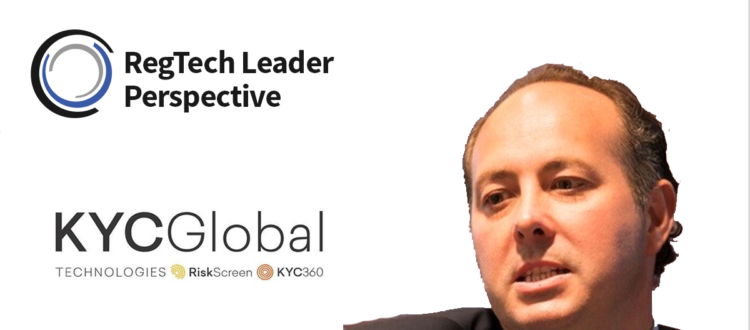Outdated understandings of money laundering risk and legacy screening tools are leaving FIs vulnerable
Companies need to rapidly evolve their understanding of money laundering risk to more effectively manage their vulnerabilities according to Stephen Platt, Chairman and CEO at KYC Global Technologies. In addition to being the original founder of the International Compliance Association and author of the qualifications now held by tens of thousands of AML professionals around the world, he also spent 25 years conducting large scale AML regulatory enquiries of financial institutions.
Financial markets around the world are fraught with money laundering incidents, and hefty fines are always closely behind them. The most notorious money laundering case in recent history is the €200m Danske Bank scandal, in which money flowed from Russia and other ex-soviet states through an Estonian branch of the bank. While this one has received the most publicity, there have been numerous AML/CTF failures by financial institutions. In January, the HKMA fined JPMorgan Chase $1.5m for failures, while the South African Reserve Bank fined HSBC $1m for failures last year.
Platt believes that the inherent vulnerabilities of financial institutions to criminal exploitation are not being managed for two principal reasons: firstly, they continue to use the outdated ‘placement, layering model of money laundering; secondly they are still utilising legacy screening and lifecycle risk management tools that are not fit for purpose. As Platt puts it ‘many banks are analogue dinosaurs in a digital age’
Stephen Platt said, “First of all, banks need to consider how their products and services can actually be abused by criminals in the commission of underlying acts of predicate criminality. Secondly, how their products and services be abused in the laundering of the proceeds from those crimes and thirdly how they can be abused in disguising the ownership or control of laundered property”
These are the three key areas of exposure which financial institutions should be monitoring when in fact the entire focus is on classic laundering vulnerability rendering Business Risk Assessments and AML control environments defective. Platt said “we have an appalling collective industrial memory, and nobody seems to be asking why despite the massive expenditure on AML compliance we continue to see the same failures often with an identical taxonomy. It’s simply because banks have not addressed the real root causes”
He goes on to say “Embracing new technologies is an important part of the jigsaw but choosing the right technologies that help you do basics well is the first step. One of the problems is that a lot of people in the industry have preconceived ideas about what technology can do for them with. They need to be educated in the art of the possible and the impossible. The technological advancements that have taken place over the course of the last 24 or 36 months have been absolutely astonishing but they cannot replace human judgement. The best technologies enhance the ability of humas to do their job better. They don’t replace them completely”
KYC Global Technologies is an AML screening and client lifecycle risk management technology supplier which helps businesses manage financial crime risk better whilst driving improved standards of risk governance through its class leading audit capture and reporting functionality. The company offers the world’s first 3D risk-based batch screening solution enabling businesses to batch screen their entire customer base in a fully risk-based fashion. Riskscreen is now used by over 800 financial institutions across 74 countries and is increasingly regarded as the benchmark by which all other batch screening solutions are judged. Platt said “In truth winning market share has not been difficult. The legacy screening providers have rested on their laurels for too long insensitive to the huge numbers of false positives their solutions have produced and poor levels of customer service”.
Riskscreen claims to reduce false positives by up to 95% compared to legacy screening tools, a claim that is backed up by users.
Adopting RegTech solutions and changing the way banks perceive money laundering risk boils down to education but Platt also thinks that regulators and international standard setting bodies need to encourage new forms of thinking if we are to avoid seeing more scandals.
“Part of the problem is that regulators get the license holder behaviour they deserve. The way that regulators manage license holder data is as outmoded as the way in which license holders manage customer data. The blind are regulating the blind and until we begin to see regulators embrace new technologies and set the pace I think many businesses will continue to rely on excel spreadsheets”
Money laundering is a global problem, not regional. This means bodies around the world need to be making the changes, but naturally, if the US was to adopt new standards it would only be a matter of time before changes happened elsewhere. If US banks were hit with renewed AML requirements, eventually these obligations would be imposed across the global banking community because of the role of the dollar as the world’s reserve currency.
Regulators look to be aware of the problem in the market, as a number have begun to make changes to their rulesets and guidelines. Earlier this month, New Zealand’s Financial Markets Authority (FMA) released its newest AML/CFT monitoring report. It indicated the key areas companies need to improve their assessments. In addition to this, it revealed it will increase reviews on independent audits, as well as the client onboarding and account monitoring processes.
The US regulators have even taken to encouraging companies to look towards RegTech solutions to improve their AML/CFT burdens. Its Federal Reserve Board made a joint statement with another four US regulators, encouraging depository institutions to explore innovative tools and technology to meet compliance.
Getting AI ready
One of the main issues with improving AML through technology, is its heavy reliance on customer data. For many organisations, this is locked away and unreachable. Platt believes AML challenges posed to financial institutions revolve around them simply not marshalling and utilising all their customer data to manage risks which are inherent in these relationships. Most of them have grown through acquisitions with the data held across isolated and disjointed legacy systems, making it incredibly difficult to aggregate and use to animate risk models.
Platt is sceptical about the value of AI in money laundering prevention. He says that “AI is only as good as the customer data and the extent to which it is both complete and organised. The reality is likely to be that in many organisations trumpeting AI as the answer they haven’t actually yet overcome the basic customer data challenge because the data is a complete mess”
Disjointed data fails to give companies the ability to get a holistic view of customer relationships and the potential risks. Platt believes that, until companies readjust their money laundering models, and improve the access to data, the market will only continue to be littered with fines.
He added, “They can’t use the metadata for effective screening purposes against external data sources, they can’t get real-time data analytics and risk profiling on the customer relationship because the data’s not working in a way that enables them to do that. It’s a shamble in many organisations. People ask why we continue to see so many money laundering scandals within the finance industry, despite hundreds of billions of dollars of fines having been imposed on the industry, and the answer very simply is because they still have not met the customer data challenge. The irony is that it really isn’t difficult to do with the right next generation technologies such as Riskscreen”
Platt is very optimistic about the new partnership between KYC Global Technologies and Salesforce to bring Riskscreen and Dow Jones data on to the Salesforce platform “Like Salesforce we are all about encouraging frictionless internal data economies in which businesses are able to use the customer data they already hold in a CRM to screen and manage relationships effectively. Consolidating the stack and creating efficiencies whilst managing financial crime risk better is the future. We are at the forefront of that”
Copyright © 2019 RegTech Analyst



